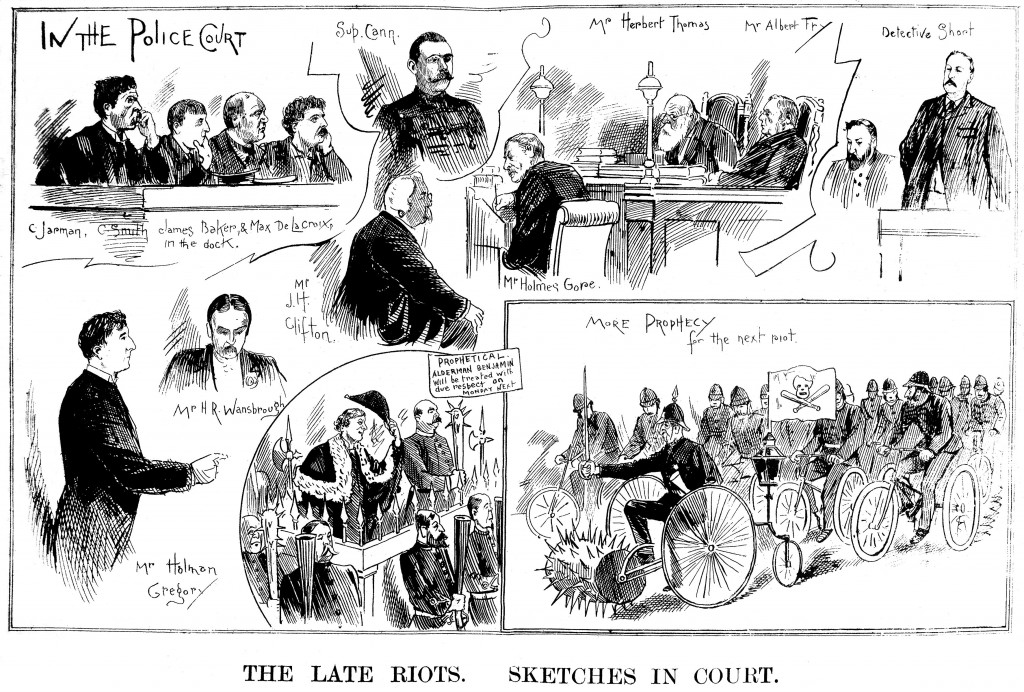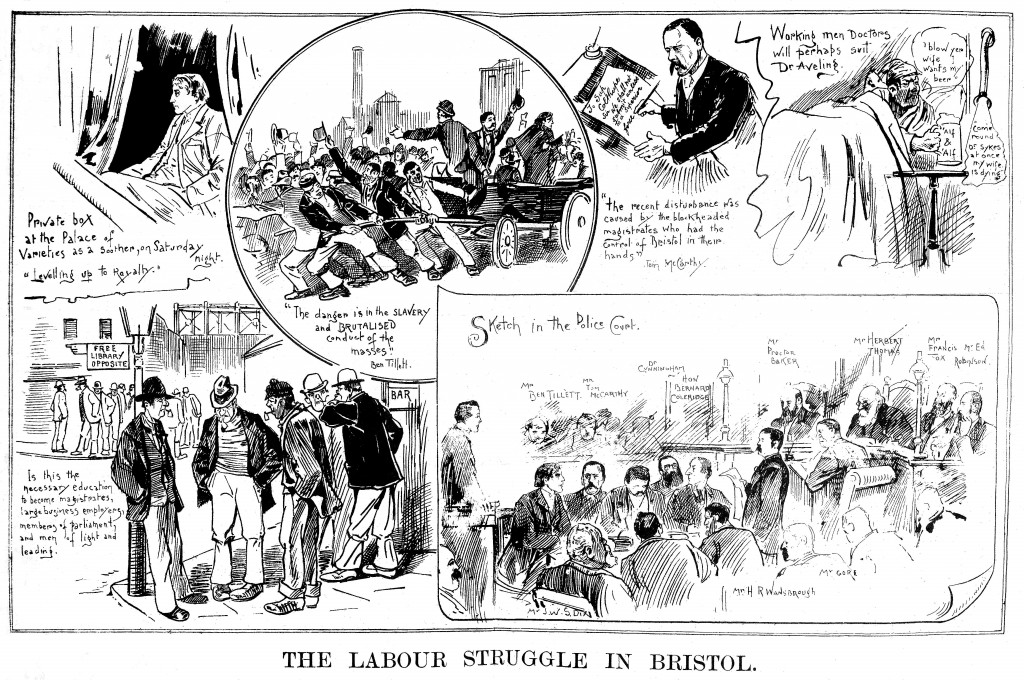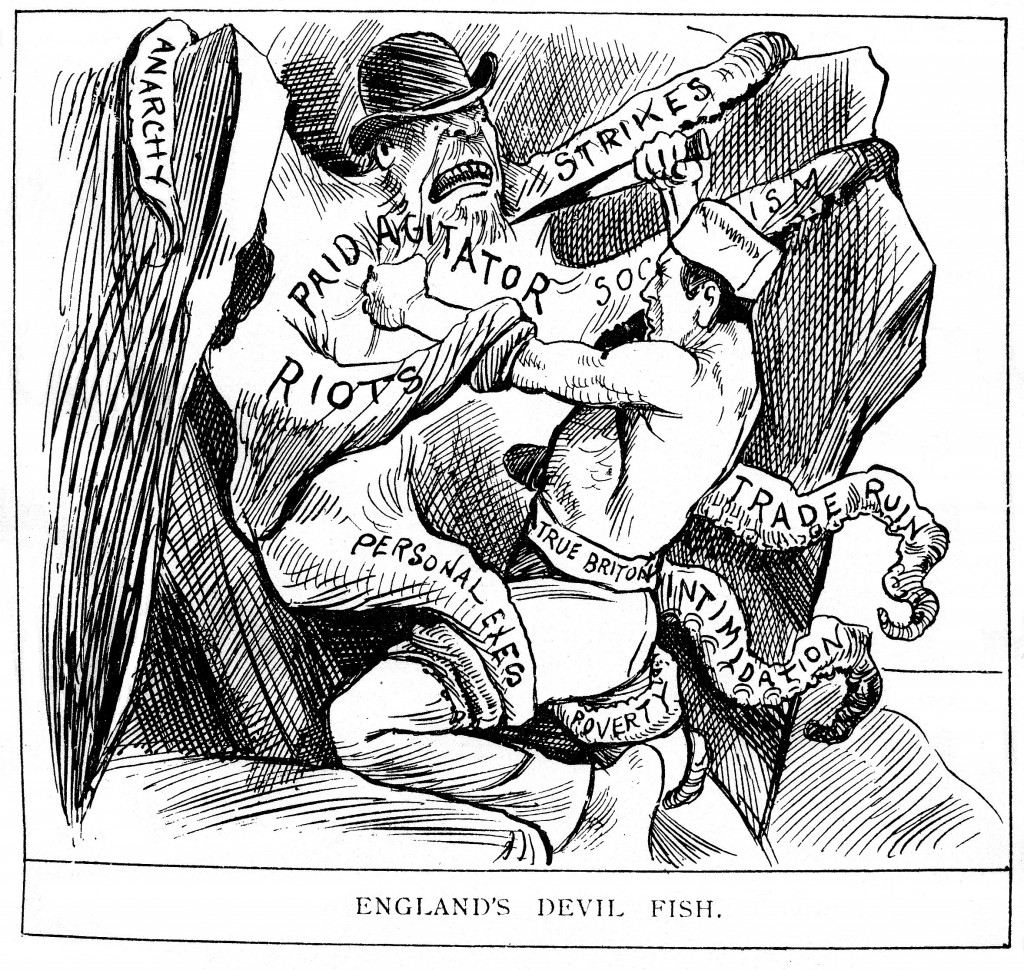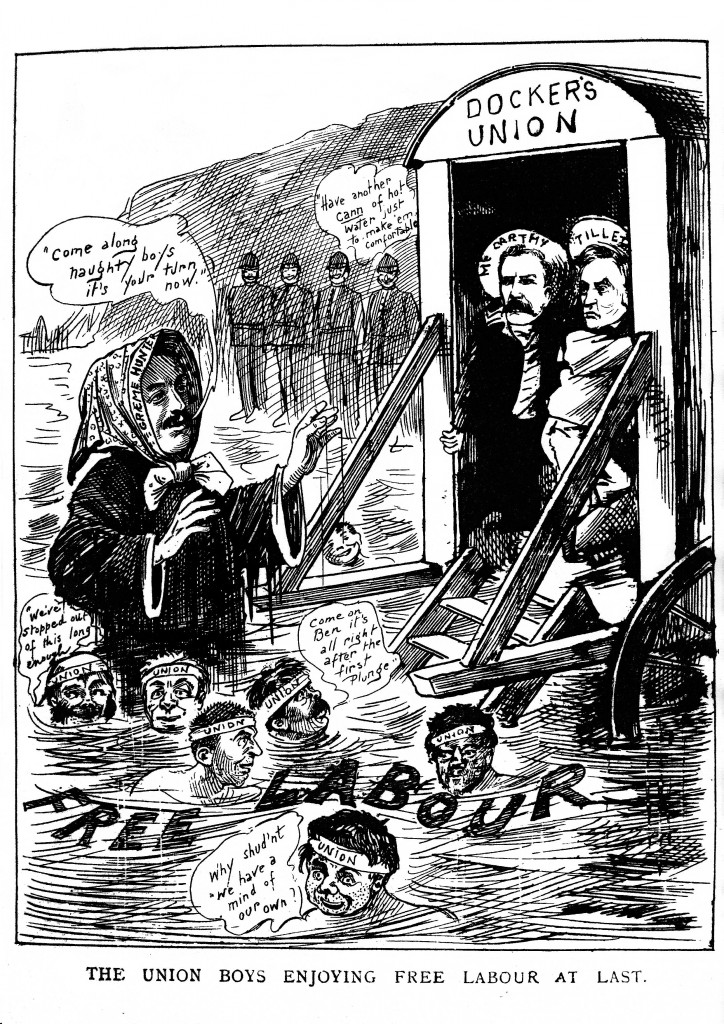These pictures were found in Bristol Central Reference Library and they should be consulted if you wish to reproduce them (refandinfo@bristol.gov.uk).
The dispute opened on 5 November 1892, when Bristol timber merchants hired non-union labourers to work alongside Dockers’ Union members. This was viewed by the men as the thin end of a wedge; if the employers could open the closed shop, as for example in Cardiff, then the union’s power would be broken, since there was always a surplus of labour. Consequently, they walked off the job, submitting their grievances to the local industrial arbitration board. The employers, however, refused to discuss the matter. Instead, they contracted with a representative of the Shipping Federation, Graham Hunter, to procure black-leg labour, declared a lock-out, and would not allow the men to return to work without the Shipping Federation ticket. The bulk of Bristol’s dockers responded by downing tools. At this point, the local union officials realized they were out of their depth and wired to London. On 17 November, Tom McCarthy arrived in Bristol to assume command of the strike. Six days later the ftrst blacklegs appeared. Feeling ran high: the following evening, when Graham Hunter’s train came in, he was met at the railway station by an angry crowd armed with sticks. Truncheon-wielding police were needed to rescue him and to disperse the men. [Ben] Tillett arrived the next day.
Ben Tillett: Portrait of a Labour Leader by Jonathan Schneer, Taylor & Francis, 1982 p 80.
The Christmas lantern procession took place in Bristol on the evening of 23rd December, 1892 and attracted hundreds of Christmas shoppers. There was a crowd of about 20,000 people in the Horsefair in the centre of Bristol. A brass band played “Rule Britannia”, speeches were delivered urging calm and orderly conduct in spite of, or perhaps because of, the presence nearby of Dragoon Guards and Hussars who had been called in from Aldershot, Hampshire. The City Council and the police were expecting a possible breach of the permit-restrictions they had imposed on the route of the procession and on the use of lanterns, and were determined to enforce their regulation.
One or two leaders of the demonstration were arrested after the speeches, and the police line which blocked the route over Bristol Bridge was broken through by determined demonstrators. It was then that the cavalry were called to break up the demonstration and drive everyone off the streets. They charged shoppers and demonstrating workers alike, pursuing them through the centre of Bristol. Fifty-seven Bristolians, many suffering head injuries from the cavalry’s sabres and batons, and fifty-one police were injured.
[Ben] Tillett and the demonstration’s organisers were later charged with sedition: inciting the violence of what became known as ‘Black Friday’. The demonstrators and organisers who were tried in Bristol were convicted and imprisoned, by courts whose magistrates included a high proportion of employers and other people with prejudicial interests. These included Charles Wills, who had ridden with the military and had ordered the cavalry charge. The City Council voted out a proposal to hold a public enquiry into the event.
Tillett, because of his access to London lawyers, was able to have his case heard at the Old Bailey in London. After a trial which brought nationwide publicity for the attacks on the Bristol demonstration and for the labour movement, Tillett was acquitted and received a hero’s welcome when he later returned to Bristol.
From Bristol Radical Pamphleteer #20 Ben Tillett by Jim McNeill.
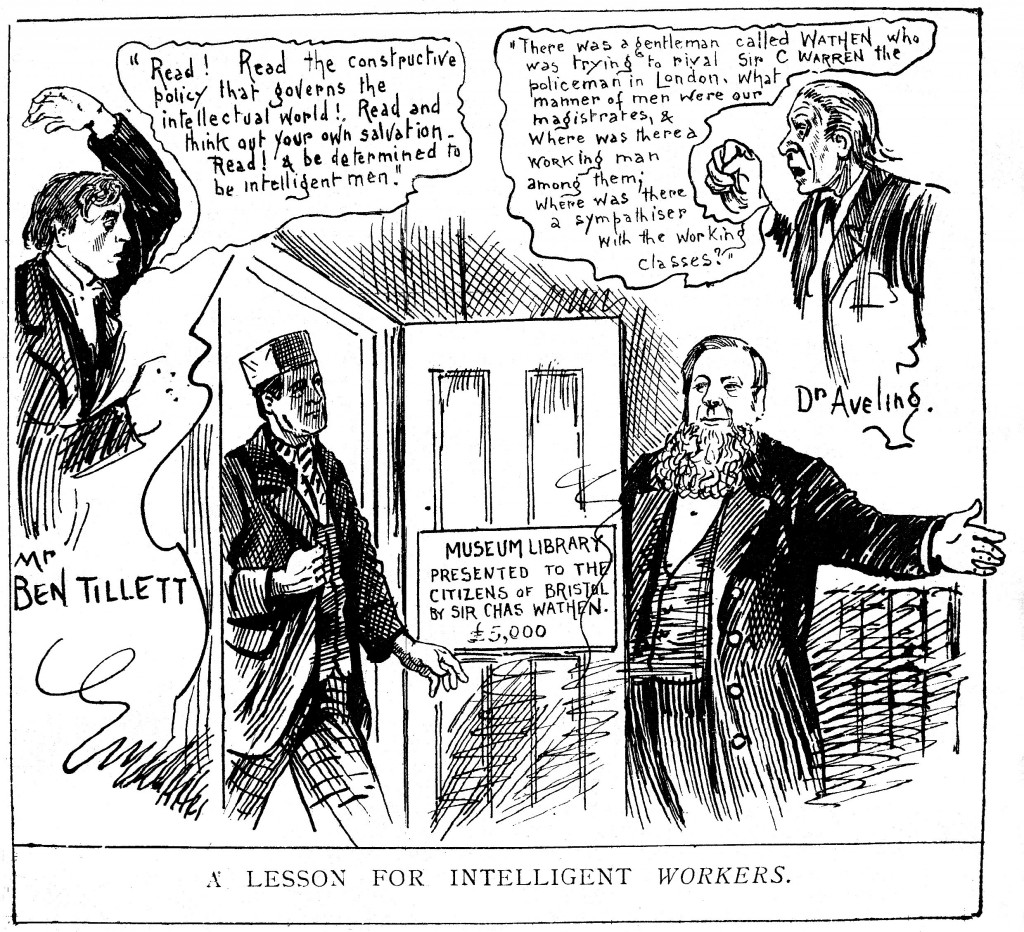
Sir Charles Wathen was a wool merchant who was Mayor of Bristol six times. Sir Charles Warren was military officer, archaeologist and the ‘Commissioner of Police of the Metropolis’ during the Jack the Ripper murders. The radical press completely turned against him after Bloody Sunday on 13 November 1887, when a demonstration in Trafalgar Square was broken up by 4,000 police officers on foot, 300 infantrymen and 600 mounted police and Life Guards [Wikipedia]. Edward Bibbins Aveling (29 November 1849 – 2 August 1898) was a prominent English biology instructor and popular spokesman for Darwinian evolution and atheism. He later met and moved in with Eleanor Marx, the youngest daughter of Karl Marx and became a socialist activist. Aveling was the author of numerous books and pamphlets and was a founding member of the Socialist League and the Independent Labour Party [Wikipedia].
Tillett was accorded a hero’s welcome when he returned to Bristol on 7 January for the preliminary hearing. He was met at the railway station by a brass band, and his carriage was unhitched and drawn through the streets by enthusiastic well-wishers… And the next day, despite a storm of snow and sleet, an estimated five thousand turned out to hear him promise again that: …”It must not fmish at trades unionism -it must not finish until the workers of all grades and degrees commanded absolutely the whole machinery of the state, the whole machinery of government, of production, control and distribution.” …. Significantly Edward Aveling, Eleanor Marx’s common-law husband, stood by Tillett’s side on the platform, and addressed the crowd when the dockers’ leader had finished. Yet Tillett’s conversion to Marxist principles, if it may be classified as such, was short lived. He had no sooner left Bristol than he began to play down both his militancy and his socialism.
Ben Tillett: Portrait of a Labour Leader by Jonathan Schneer, Taylor & Francis, 1982 p 85.
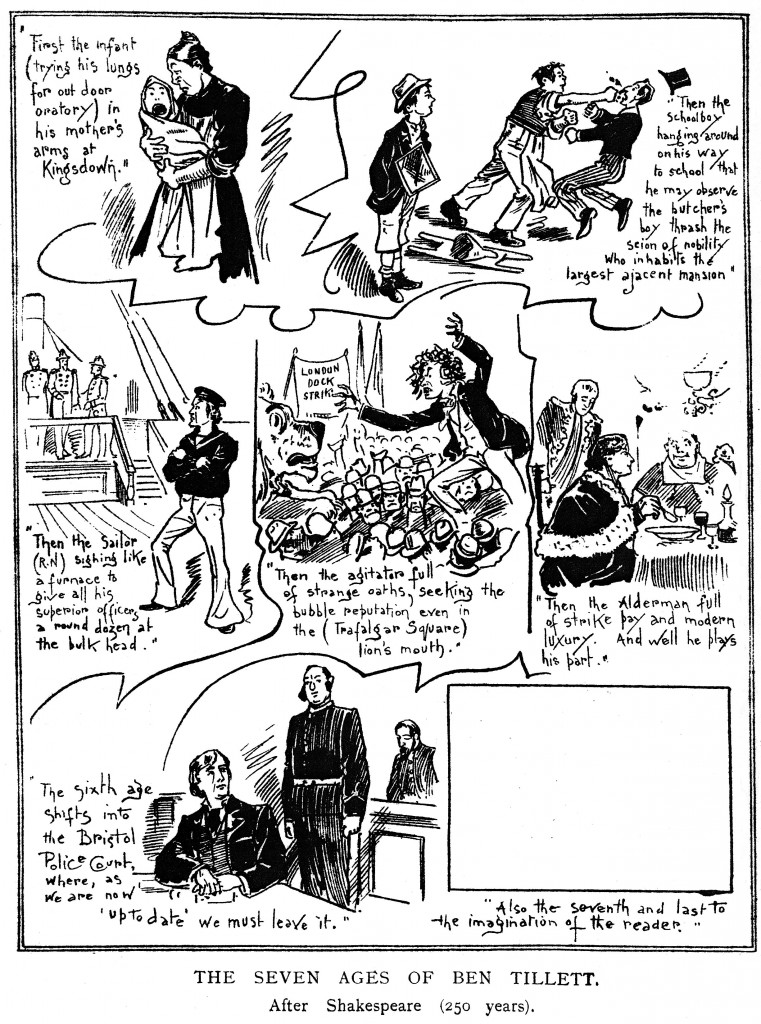
“Sum of the things we didn’t see in the labour possession last Saturday! Wot’s the good ov that? Tell us wot you did see and not wot you didn’t. Was ther any death’s heads or cross-bones in the possession, Jones, that’s wot I wants to know!”
“No, Lizer, nothing so bad as that. But they had heaps ov banners and flags and poles with lanterns on em what they sed fritened the maginstrates last time! Then ther was flags and banners and bands ov music and thousands ov people looking at um and lafing at jokes on the banners and poles. One had a little loaf and a bit of cheese, what they called “the docker’s dinner.” Then ther was another had a flag with “United we stand,” and all that sort ov thing.”
“Well I ‘spose they would stand united but I got to stand all round sometimes by meself, but they be oney united enuf to drink. But wasn’t ther any bobies nor soldiers nor nothink!”
“Not a swad, but plenty ov pleece. They march’d four a-brest in front to make a way for um thro’ the peeple, and also four a-brest behind to keep the peeple off or else the crowds on the path and the horses and carts and trams and one thing and another wood have crunched un all up!”
“But wasn’t ther no fiting, nor broken heads, and people crushed to death and walked over?”
“Not as I seed, Lizer! Everything passed off most orderly, but then they wasn’t all unemploid. ‘ Twas Saturday half-holiday, and thousands ov the factory hands and workers turned out to see the site and join in the possession. That’s wot kept um orderly, for most ov the respectacle working men will have nothing to do with any demonsteration up against law and order, that’s how ‘twas wen the possession arrived on the Grove, most ov um skedalled to ther homes and left the dockers to enjoy all the long-winded speeches to therselves!”
“Then wot good did the demonsteration do?”
“They collected a few pouns on the road, but it must a cost um all they got for expenses. I did yer as how Ben Tillett gets three pounds every time he speaks! If Wilson, and Hardie, and all that lot gets three pound a-piece, ther wasn’t much left for the poor dockers, to say nothing ov expenses for printing and flags, banners, poles, devices, &c.”
“That’s wer the poor dupes be had. They thinks its all done for luv ov the thing, and furgets its all the £ s. d., but they’ll get their eyes open sum ov these days, and then ‘twill be who’d a thought it!”
“We must call um together again, Lizer. They wants a good talking to. They be easy enuf to lead. As gentle as lambs, but you mustn’t drive um. They won’t be drove.”
“I know um, Jones, leave um to me. Didn’t I lead um to victory at the gas strike? Didn’t I make it all rite for the cotton factory strikers? Didn’t I put um rite over the bricklayers’ strike? Wasn’t it me as arranged the Avonmouth affair? I can do it for um if they’ll only listen to me. First ov all I shud stand drinks all round, then I should talk to um like a Dutch uncle, and ask um quietly how much better off they be since they joined the Union. How much they had gained in pocket, ov course reckoning strikes, strike funds, and all other expenses including loss ov wages since they belonged to the Union. I shud giv um five minits’ silence thought, nobody to speak, everyone to think. At the end ov that five minits I should hav all the sober, thoughtful, real workers on my side, and they’d chuck the L.U. for ever. Wot do you think, Jones?”
“Well, you can but try it Lizer.”
And I’m going to, now. Hooroo!”
From The Bristol Magpie. Saturday 11th February, 1893.
The article above refers to a march that took place on Saturday 4th February, 1893, as does the cartoon below. It seems that Bristol expected a repeat of ‘Black Friday.’
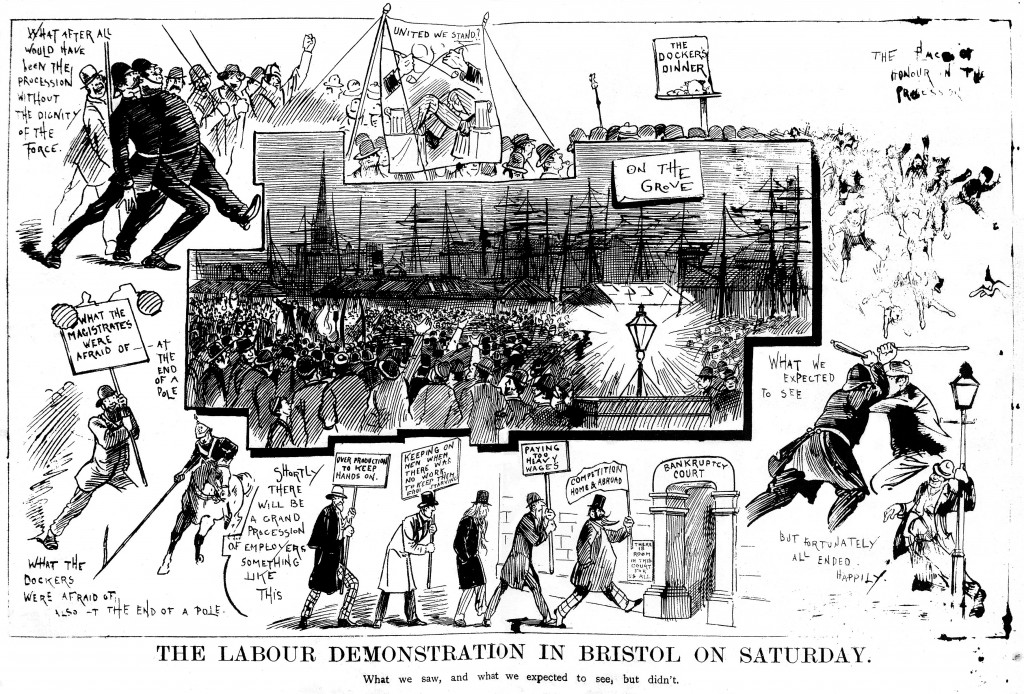
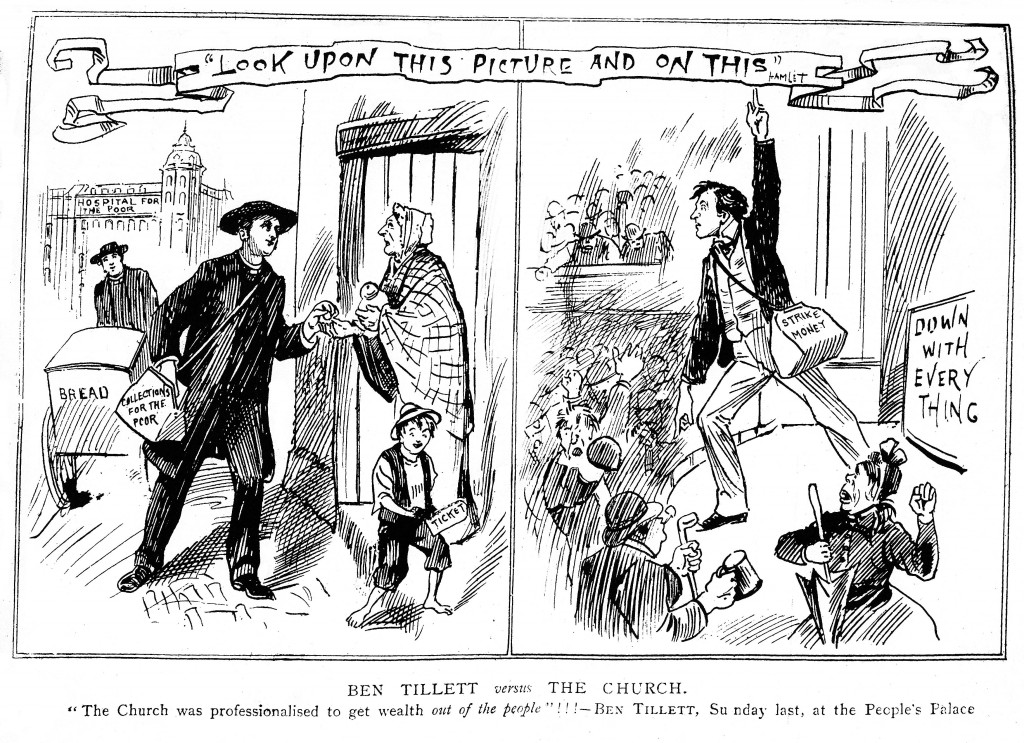
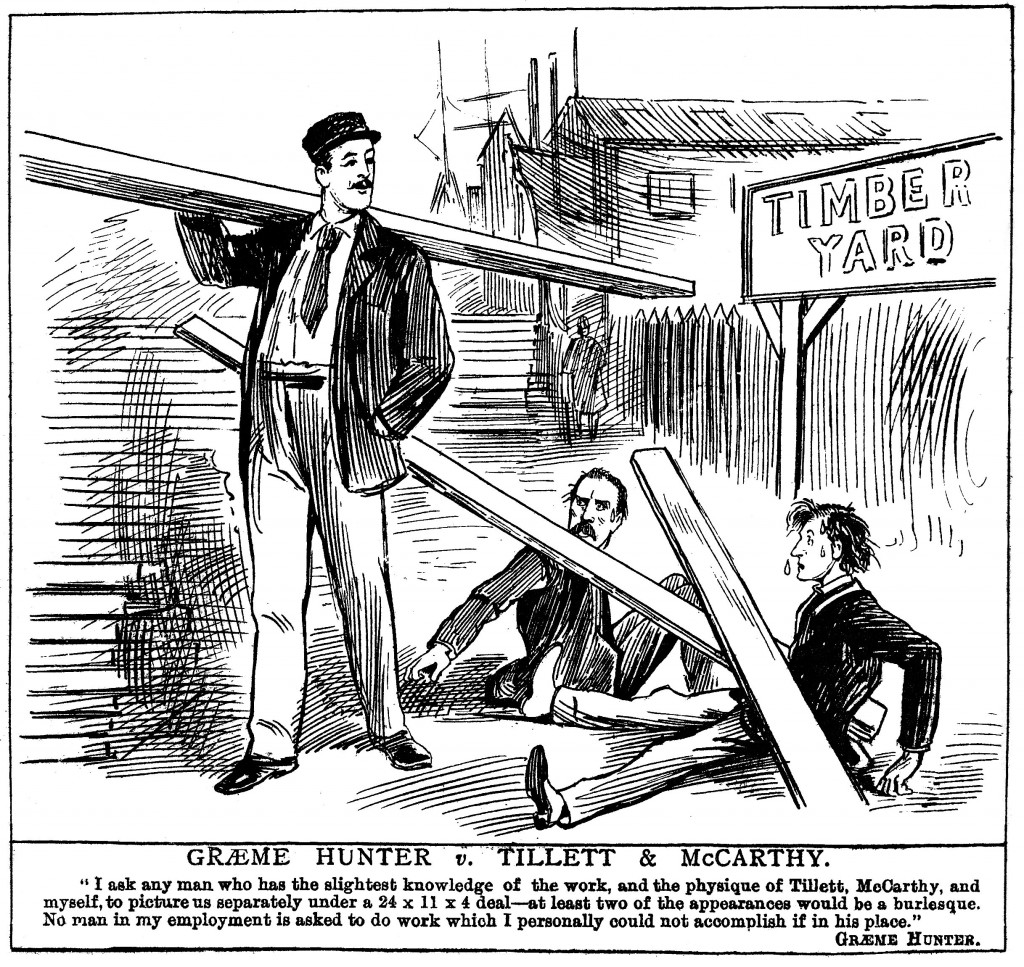
Graham Hunter had organised black-leg labourers to break a strike in November 1892. Tom McCarthy was the leader of the Amalgamated Society of Stevedores. Ben Tillett was Alderman of London County Council and a dockers’ union leader.
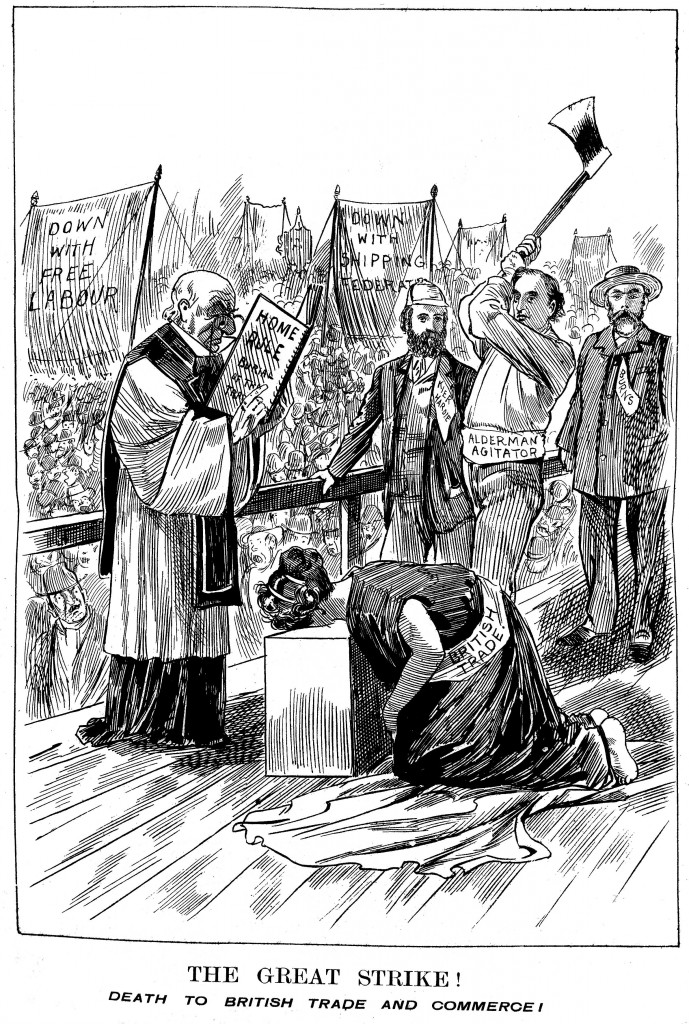
Ben Tillett is labelled “Alderman Agitator”. Kier Hardie was the Independent Labour Party MP for West Ham South and John Burns was the Independent Labour Party MP for Battersea, both were elected in 1892.
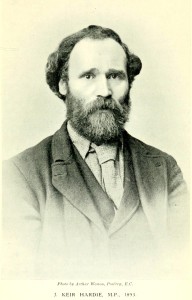
The Apostle of Free Labour
by William Collison, 1913,
available at archive.org
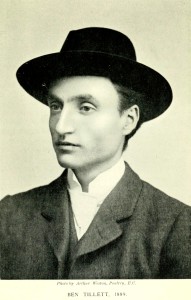
The Apostle of Free Labour
by William Collison, 1913,
available at archive.org
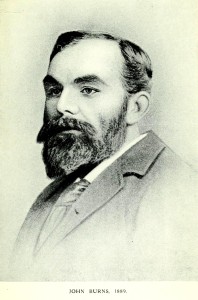
The Apostle of Free Labour
by William Collison, 1913,
available at archive.org
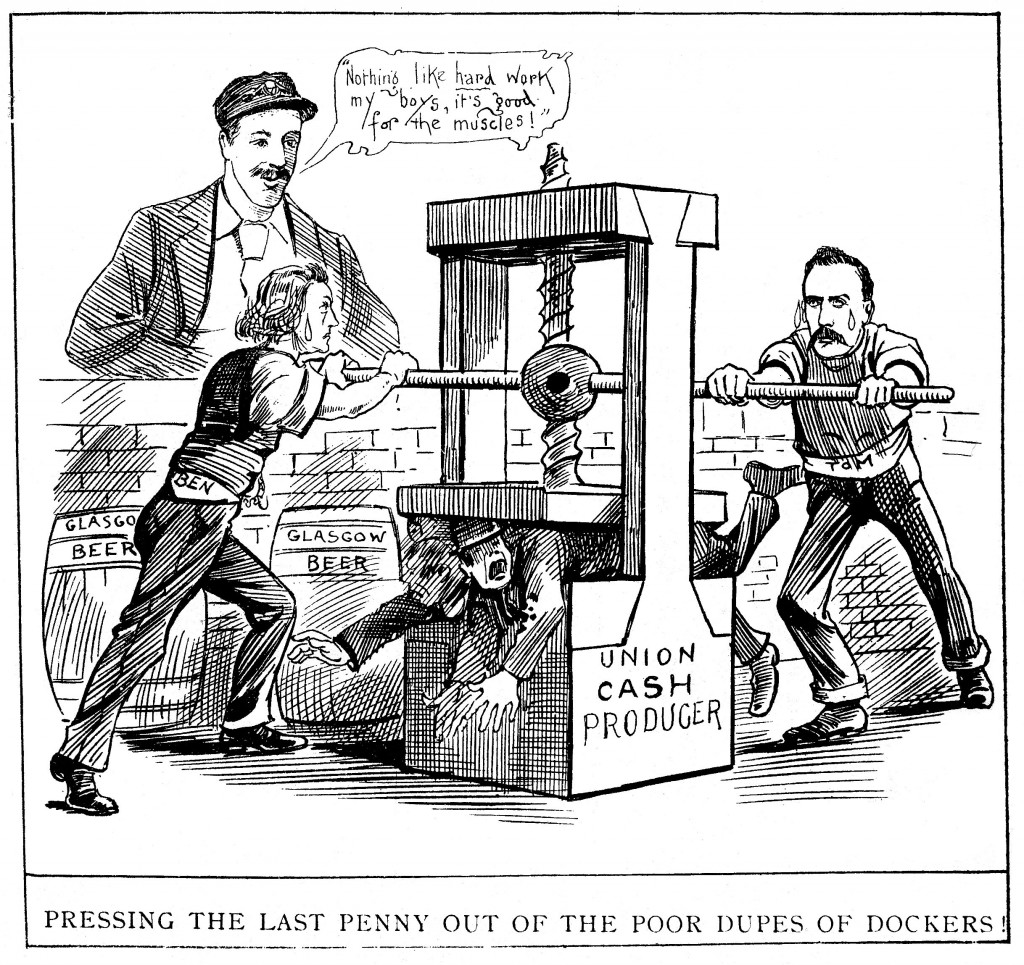
The dockers had to concede defeat in the spring of 1893.
